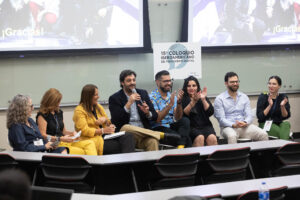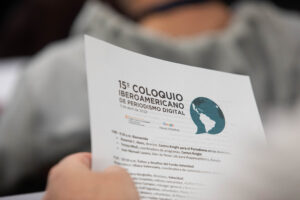
The Ibero-American Colloquium on Digital Journalism celebrated its 15-year anniversary with a return in person and online. For the last two years, the conference was virtual because of the pandemic.

Panel of the successes and challenges of recipients of the Velocity Fund. (Patricia Lim/Knight Center)
As in previous editions, the colloquium took place the day after the International Symposium on Online Journalism, on Sunday, April 3, and was sponsored by Google News Initiative.
The Ibero-American Colloquium annually brings together journalists from Latin America, Spain, and Portugal at the University of Texas at Austin to discuss the present and future of digital journalism in the region. It is a tradition that began in 2008 with a small group and has grown over the years.
“We started the Coloquio after noting that ISOJ was attracting more and more journalists, media executives and scholars from Latin America and the Iberian Peninsula, so we planned to have a special meeting for them in Spanish, immediately after the symposium,” said professor Rosental Alves, founder and director of the Knight Center for Journalism in the Americas. “This year, we proved once again that the Coloquio is a strong and important conference on its own, an excellent complement to ISOJ.”
Borja Echeverría, managing editor of Spanish newspaper El País, was the keynote speaker of the colloquium, which included panels on fact-checking, innovation and press freedom in Nicaragua, and a variety of presentations about other topics of journalism in Ibero-America.
During his keynote session, Echeverría talked about the success of El País’ digital subscription, which was launched at the beginning of the pandemic, in 2020. According to his estimates, the newspaper will soon reach 200,000 digital subscribers. For the newspaper industry in 2022, Borja said, it is very important that “the editorial model, the business model, the technology model and, I’d add, marketing” are well integrated, “super greased and everything has to work perfectly and be aligned.” “I think these are four levers that have to go hand in hand in companies, he said”
The first panel of the day focused on the successes and challenges of the Velocidad Fund that helped several innovative news startups in Latin America to diversify their revenue streams and become self-sustainable. “We sowed a work culture, a change of mindset in the [participating] organizations, around thinking about sustainability and incorporating key people for these [strategic] areas,” said Vanina Berghella, director of the Velocidad Fund, an accelerator program for Latin American digital media.

(Patricia Lim/Knight Center)
Also during the colloquium, four Nicaraguan journalists gave testimony about the dire conditions for journalism in their home country, overcoming obstacles in the field and in exile. They talked about how the international community can show solidarity.
“I don’t want you to see us as defeated because we’re not. We continue doing journalism and we are going to continue,” said Octavio Enríquez, an investigative journalist for Confidencial.
During the final panel, fact-checkers from Latin America and Spain stressed the importance of collaboration.
“In our case [collaboration] is what we do every day, all the time. We have an impact, but we have much more impact because we work collaboratively and we don’t repeat ourselves. We don’t invent the wheel over and over…”, said Laura Zommer, executive director of Chequeado in Argentina and panel moderator.
To close out the event, seven journalists from the region delivered 5-minute lightning presentations on innovative projects and lessons learned in recent years.
Nearly 60 people from 10 countries in Latin America, as well as Spain and the U.S., attended this year’s colloquium in person on the campus of the University of Texas at Austin in the Moody College of Communication. Additionally, the live stream racked up 726 views, 102 likes and 94 chat messages. More views are racking up since the video has been made public following the event.
Video, the program and a list of speakers from the Colloquium are available at isoj.org/coloquio/. Read coverage of the event at isoj.org/category/coloquio/.